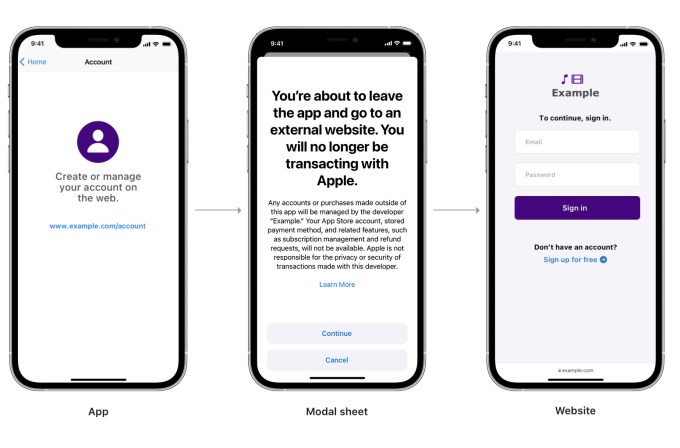Apple to now allow ‘reader’ apps to use external links, if approved
Apple today announced it will begin to allow a subset of applications sold on its App Store to link to an external website where users can create or manage their accounts with the app developer. The change to Apple’s App Store Review guidelines only applies to what Apple calls “reader” apps — meaning, apps designed primarily to provide access to some sort of digital content, like magazines, books, audio, music or video. Apple’s plans were first announced last September in the context of the tech giant’s settlement with a Japanese regulator, the Japan Fair Trade Commission (JFTC), and had been set to arrive sometime in early 2022.
The company had earlier said the changes would apply globally to all reader apps on the App Store when they went live, but had not provided an exact launch date.
Today, Apple’s App Store Review Guidelines have been updated with a new reference that explains how Reader apps can implement this feature.
Specifically, Apple instructs developers to apply for something it calls the External Link Account Entitlement in order to provide this functionality in their own apps. An entitlement is something Apple uses when it wants to still have control over the situation in terms of which developers can implement a certain feature. That is, instead of just changing the App Store rules so this type of behavior is broadly permitted for apps in the supported category, the entitlement process requires developers to ask and then receive approval for this special use case. This way, Apple can very carefully vet the apps being allowed to add the links instead of leaving it up to its App Review team.
The company also published usage guidelines and implementation details for developers who are approved to use the external link option. Here, Apple explains that not all apps that offer access to digital content will be approved — the access to digital content has to be the app’s “primary functionality,” Apple states. For instance, a social networking app (ahem, Facebook) where users can also stream videos would not be eligible.
Apple also says that, in order to be eligible, the apps must allow the users to access content or services they had previously purchased outside the app; they must allow people to sign in to their account; and they cannot facilitate real-time, person-to-person services — like live tutoring, fitness instruction, real estate tours or medical consultations.

Image Credits: Apple
Notably, Apple says apps that choose to use the External Link Account Entitlement cannot offer in-app purchases on either iPhone or iPad devices. It’s an either/or situation.
Apple’s instructions detail how the links should work, too, including how they must open up in a new browser window and not a web view, for instance, and how the links should appear. The developer’s web page also can’t advertise the pricing offered outside the App Store. It can only say something very simple like: “go to example.com to create or manage your account.” There are several other more technical requirements, as well.
It’s worth pointing out that these changes have only come about due to governmental regulations and not because Apple believes this is the right thing to do for its App Store. It’s clear from the heavy-handed way it’s implementing this support — and the rules around its use — that the company views this change as a slippery slope that could ultimately lead to App Store revenue loss.
The changes come at a time when lawmakers and regulators alike have been putting pressure on the app store providers, Apple and Google, in the wake of anti-competitive complaints. The platforms are also battling this out in the courts, as Apple and Google are doing now with Fortnite maker Epic Games, whose antitrust case with Apple is now under appeal. Another class-action lawsuit pushed Apple to agree that developers were allowed to contact their customers about payment methods using the contact information they collected in their apps.
In addition to today’s change for reader apps, South Korea has passed legislation that bans Apple and Google from requiring that developers use their respective payment systems. More recently, a bipartisan App Store bill targeting Apple and Google was approved by the Senate Judiciary Committee, suggesting that U.S. legislation is on the horizon, too. But instead of getting ahead of the changes with an overhaul of how the App Store operates, Apple has been clinging on to every last bit of control it has even as it attempts to adhere to the regulations. This stance has gotten so bad that, in the Netherlands, Apple has been now fined 10 times by the local regulatory authority for non-compliance with new rules around third-party payment support for dating apps.
Though Apple has opened up access to request the External Link Account Entitlement today, it notes the API will be available for reader apps to build and test in an “upcoming beta release of iOS and iPadOS.”
from TechCrunch https://ift.tt/LN4CVBh
Comments
Post a Comment